沪教牛津版八年级上册英语教材
沪教牛津初中英语初英语八年级英语上册

Unit 1百科全书_______ _________________ 人的_______ _________________ 恐龙_______ _________________ 意大利人_______ _________________ 发明家_______ _________________ 音乐家_______ _________________ 科学家_______ _________________ 出生;诞生;_______ _________________ 乡村\农村_______ _________________ 才智/智慧_______ _________________有艺术天赋的_______ _________________能力,才能_______ _________________可能,大概_______ _________________ 发明_______ _________________ 笔记本_______ _________________ 包括;包含;_______ _________________ 甚至_______ _________________ 然而;可是_______ _________________ 突然,忽然_______ _________________ 没有人_______ _________________ 化石_______ _________________(在…中)获_______ _________________ 胜,赢;美元_______ _________________ 在乡村,在农村_____________________________ 人_____________________________ 灭绝,消失_____________________________ 了解,弄清_____________________________ 去散步____________________________ 从很小的时候____________________________ 艺术能力____________________________ 变老____________________________ Unit 2数字 [pl.] _______ _________________指示,命令_______ _________________检查;核实_______ _________________克(重量单位)_______ _________________儿子_______ _________________国际象棋_______ _________________印度_______ _________________充满智慧的_______ _________________向(某人)_______ _________________挑战许诺;承诺_______ _________________ 奖赏;奖品_______ ________________________ _________________ 谷粒国际象棋_______ _________________ 棋盘(使)加倍_______ _________________ 数量;数额_______ _________________ 剩余部分_______ _________________ 金子;黄金_______ _________________ 代替;顶替_______ _________________认识到;意_______ _________________ 识到抄写;誊写_______ _________________准确无误_______ _________________ 地交通_______ _________________ 事故_______ _________________ 很久以前_____________________________向(某人)_____________________________ 挑战...等等_____________________________ 抄写_____________________________ Unit 3订货;订购_______ _________________ 比较;对比_______ _________________====Word行业资料分享--可编辑版本--双击可删====(计算机)_______ _________________显示器扬声器_______ _________________(计算机)_______ _________________主机键盘_______ _________________鼠标_______ _________________打字_______ _________________脑_______ _________________操纵,控制_______ _________________昂贵的_______ _________________极小的_______ _________________依靠;依赖_______ _________________计算_______ _________________速度_______ _________________操作;控制_______ _________________铁路系统_______ _________________公司_______ _________________价格_______ _________________总额合计_______ _________________英寸_______ _________________出售;售卖_______ _________________受欢迎的_______ _________________从事……工_____________________________作没意识到_____________________________依靠_____________________________除…以外_____________________________总计;共计_____________________________期待;盼望_____________________________ Unit 4广告_______ _________________好笑的,滑_______ _________________ 稽的创作,创造_______ _________________电话机,电_______ _________________ 话车轮_______ _________________舒适的,舒_______ _________________ 服的四轮马车_______ _________________ 世纪_______ _________________ 乘客,旅客_______ _________________ 创新,发明_______ _________________实用的,适_______ _________________ 用的从...开始,_______ _________________ 自...以来距离. 间距_______ _________________移动电话,_______ _________________ 手机随便什么时_______ _________________ 候在任何时候开发,研制_______ _________________灯_______ _________________ 蜡烛_______ _________________ 白天_______ _________________ 灰尘,尘土_______ _________________特殊的,特_______ _________________ 别的机翼,翅膀_______ _________________ 引言_______ _________________ 替换,顶替_______ _________________ 汽油_______ _________________自那以来_____________________________ 与..保持联系_____________________________在白天_____________________________使..不接近_____________________________同时_____________________________ Unit 5有关教育的,有教育意义的_______ _________________ 交流,互访_______ _________________ 文化_______ _________________ 主人_______ _________________====Word行业资料分享--可编辑版本--双击可删==== 地方的,当地的_______ _________________英国的_______ _________________高兴的,愉快的_______ _________________客人,宾客_______ _________________筷子_______ _________________工作日_______ _________________在...旅游_______ _________________极好的,了不起的_______ _________________(一次)经历,经验_______ _________________太极拳_______ _________________已经,早已_______ _________________使...初次了解,使尝试_______ _________________成功_______ _________________尚未.仍未_______ _________________慎重对待,尊重_______ _________________起初,起先___________________________到目前为止___________________________小量___________________________使..... 初次了解___________________________从....到.....___________________________ Unit 6古代的_______ ________________________ _________________ 战争_______ _________________ 懂;理解_______ _________________ 差别_______ _________________ 金字塔_______ _________________ 首领_______ _________________ 希腊人_______ _________________ 攻占_______ _________________ 士兵_______ _________________ 巨大的_______ _________________ 拖,拉动_______ _________________ 主要的_______ _________________ 庆祝.庆贺_______ _________________ 笨的;傻的_______ _________________午夜;子夜_______ _________________空的_______ _________________ 除……之外_______ _________________ 秘密的_______ _________________ 侧面_______ _________________ 安静地_______ _________________ 陆军部队_______ _________________ 进入_______ _________________ 达到目的_______ _________________ 计谋_______ _________________ 王子_______ _________________ 王后_______ _________________ 偷_______ _________________ 处罚_______ _________________ 场_______ _________________ 先生_______ _________________将表演出来____________________________拿…开玩笑____________________________除……之外____________________________大量的____________________________最后____________________________加油____________________________====Word行业资料分享--可编辑版本--双击可删==== Unit 7_______ _________________记忆力;回忆角_______ _________________失去,丧失_______ _________________改进,提_______ _________________高,改善提到,说到_______ _________________方法,办法_______ _________________拼写,拼法_______ _________________头脑,大脑_______ _________________可笑的_______ _________________英里_______ _________________字母_______ ________________________ _________________值得,有价值的拼写_______ _________________除非_______ _________________困难_______ _________________清单_______ _________________步骤_______ _________________循环_______ _________________====Word行业资料分享--可编辑版本--双击可删====类似的,相_______ _________________像的纸币_______ _________________钱包,皮夹_______ _________________子篮,筐_______ _________________经理_______ _________________提取(款)__________________________________________________________涌出Unit 8演说_______ _________________通告_______ _________________比赛;竞赛_______ _________________珍宝_______ _________________文本_______ _________________机会;机遇_______ _________________自信地_______ _________________话题_______ _________________优胜者_______ _________________建议_______ _________________det.几个;_______ _________________一些意见;想法_______ _________________整个的_______ _________________建议.提议_______ _________________====Word行业资料分享--可编辑版本--双击可删====沟通_______ _________________在任_______ _________________何……时候富有的_______ _________________贫穷的_______ _________________藏;隐蔽_______ _________________袭击;攻击_______ _________________羞怯的_______ _________________其他的_______ _________________选择_______ _________________寻宝游戏___________________________公开地___________________________上演___________________________依我看___________________________最重要的是__________________________小心__________________________bebecomebeginblowbreakbuild burn buy catch choose come cut digdo draw drink drive eat fall feel fight find fly forget get givegrow hang have hear hide keep know lead learn leave let lie light lose make mean meet put read ride ringrise run say see sell send shine shoot sing sit sleep smell speak spell spend stand steal stick swim take teach tellthink throw understand wake wearwinwrite。
新沪教牛津版八年级上册英语 Unit 2 Period 3 教学课件

第十九页,共二十一页。
Mandy did not copy her homework correctly, so she called Joyce. In pairs, check the Maths problems in Mandy’s exercise book. Follow the example.
第十四页,共二十一页。
Talk time: Strong and weak forms
第十五页,共二十一页。
第十六页,共二十一页。
Listen to the conversation below. Pay attention to the pronunciation of the words in blue. Then practise it in pairs.
Joyce: Hello, this is Joyce speaking.
Mandy:
Joyce: Hi, Mandy. What can I do for you?
Mandy:
copied down
correctly.
check
Joyce: OK.
Mandy:
Joyce: No. It should be seventy-two plus two hundred
January (Jan.)
2月
3月 March (Mar.)
4月
5月 May
6月
7月 July
8月
9月 September (Sept.) 10月
11月 November (Nov.) 12月
February (Feb.) April (Apr.) June August (Aug.) October (Oct.) December (Dec.)
牛津上海版英语八年级上册课件:U5-Workbook(共28张PPT)

We need _________ flowers for the party.
I need _________ medicine. I have _________ terrible cold.
_________ insect bit① my arm. It’s itchy②! I need
_________ cream.
3 _______________________ _______________________ _______________________
Complete the sentences with another, other(s) or the other(s).
The films at that cinema did not look interesting, so we went to __________ one.
Many different kinds of birds (5)__________ around the world. In many countries, people like to (6)__________ beautiful birds as pets. They choose birds that are (7)__________ and do not hurt people or other animals. They also choose birds that can learn to talk, such as parrots. Mr and Mrs Wang bought a parrot last week. When they got home, they were very surprised when the bird suddenly said, ‘For my dinner, I want two bowls of water and a (8)__________ of birdseed, and hurry!’
沪教牛津版八年级上册英语教材
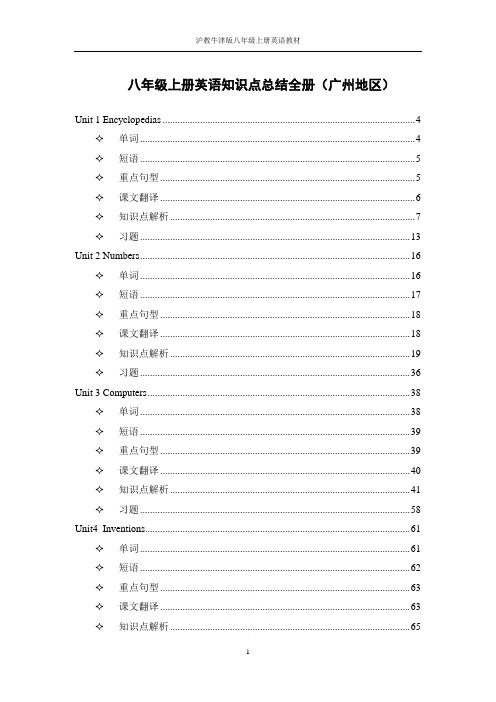
八年级上册英语知识点总结全册(广州地区)Unit 1 Encyclopedias (4)✧单词 (4)✧短语 (5)✧重点句型 (5)✧课文翻译 (6)✧知识点解析 (7)✧习题 (13)Unit 2 Numbers (16)✧单词 (16)✧短语 (17)✧重点句型 (18)✧课文翻译 (18)✧知识点解析 (19)✧习题 (36)Unit 3 Computers (38)✧单词 (38)✧短语 (39)✧重点句型 (39)✧课文翻译 (40)✧知识点解析 (41)✧习题 (58)Unit4 Inventions (61)✧单词 (61)✧短语 (62)✧重点句型 (63)✧课文翻译 (63)✧知识点解析 (65)✧习题 (68)Unit5 Educational exchange (71)✧单词 (71)✧短语 (72)✧重点句型 (72)✧课文翻译 (73)✧知识点解析 (74)✧习题 (83)Unit 6 Ancient stories (85)✧单词 (85)✧短语 (87)✧重点句型 (87)✧课文翻译 (88)✧知识点解析 (89)✧习题 (95)Unit 7 Memory (100)✧单词 (100)✧短语 (101)✧重点句型 (101)✧课文翻译 (102)✧知识点解析 (103)✧习题 (109)Unit 8 English Week (114)✧单词 (114)✧短语 (115)✧重点句型 (115)✧课文翻译 (116)✧知识点解析 (117)✧习题 (122)每单元必考语法点预览Unit 1 some与any的用法& 复合不定代词somebody, anybody, nobody等的用法Unit 2基数词及数字的表达& 序数词Unit 3形容词的比较级与最高级Unit 4 good, bad, far & (not) as…as…Unit 5现在完成时& already, yet, ever, neverUnit 6 现在完成时中since, for & 现在完成时与一般过去时的区别Unit 7(真实性)条件状语从句& if…not 与unlessUnit 8情态动词should, had betterUnit 1 Encyclopedias 单词suddenly adv. [ˈsʌdn:lɪ] 意外地,忽然地nobody pron. [ˈnoˌ bədi] 没有人,无人fossil n. [ˈfɑsəl] 化石win v [wɪn] 获胜,赢dollar n [ˈdɑlɚ] 美元✧短语1.in the countryside 在乡村,在农村11.for example 例如2.human being 人12.next to 紧挨着3.die out 灭绝,消失13.look up 查阅4.find out 了解,弄清14.live on Earth 生活在地球上5.go for a walk 去散步15.an Italian painter 一位意大利画家6.be born 出生ed to do sth 过去常常做某事7.more than 多于,超过17.at the end of 在…末尾8.just like 正如,正像18.in the centre 在中心9.how long 多久e out of…从…出来10.would like 想要20.be famous for 以…而闻名✧重点句型1.Some dinosaurs were as small as chickens. 有的恐龙和鸡一样小。
沪教牛津版英语上册八年级全册教案-沪教牛津版8年级英语上册
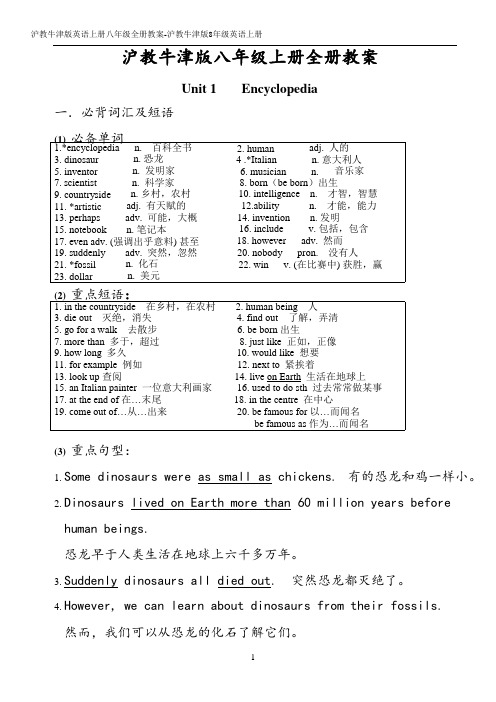
20. nobody pron. 没有人 22. win v. (在比赛中) 获胜,赢 adv. 突然,忽然 n. 化石 n. 美元 19. suddenly21. *fossil23. dollar10. intelligence n. 才智,智慧 12.ability n. 才能,能力 14. invention n. 发明 16. include v. 包括,包含 18. however adv. 然而 17. even adv. (强调出乎意料) 甚至8. born (be born )出生 音乐家 n. adj. 人的 n. 意大利人 2. human 4 .*Italian 6. musician n. 百科全书n. 恐龙 n. 发明家 n. 科学家 n. 乡村,农村 adj. 有天赋的 adv. 可能,大概 n. 笔记本 1.*encyclopedia 3. dinosaur5. inventor7. scientist9. countryside11. *artistic13. perhaps15. notebook沪教牛津版八年级上册全册教案Unit 1Encyclopedia 一.必背词汇及短语(1) 必备单词(3) 重点句型:1. Some dinosaurs were as small as chickens. 有的恐龙和鸡一样小。
2. Dinosaurs lived on Earth more than 60 million years before human beings.恐龙早于人类生活在地球上六千多万年。
3. Suddenly dinosaurs all died out. 突然恐龙都灭绝了。
4. However, we can learn about dinosaurs from their fossils. 然而,我们可以从恐龙的化石了解它们。
5.Nobody knows why. 没有人知道其中的原因。
新沪教牛津版八年级上册英语 Unit 2 Period 5 教学课件

Homework
1. 将自己上学期的英语成绩绘成一幅曲线图, 并完成分析报告。
2. 完成《练习册》第28页Writing的练习。
第十二页,共十二页。
第十页,共十二页。
B Look at the line graph on p. 28 about the number of students at junior high schools in May’s
city. Then write a report by following the example in A.
第八页,共十二页。
A report with numbers
Look at the line graph and plete the table below.
Year Number
2009
2010
2011
2012
第九页,共十二页。
Write sentences using information from the table and following the example below.
Number of students in junior high schools
________________________________________________________ ________________________________________________________ ________________________________________________________ ________________________________________________________ ________________________________________________________ ________
沪教牛津版八年级英语上册课件Unit 6 Speaking
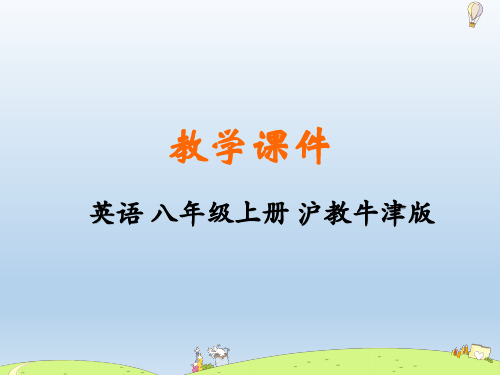
Plot:The Trojans make jokes about the Greeks.
Setting: After the party, the Greek soldiers talk in the wooden horse.
fallen asleep. Let’s climb out and open the main gates! Greek soldier B: Come on! Our army is waiting outside the city. The Greek soldiers climb out of the horse quietly and when open the main gates. The Greek army enter the city. …
with them. Get some help and pull it into the city. That won’t be difficult. It’s on wheels. Solider: Yes, sir! (The solider leaves)
Scene 2 All the Trojans celebrate in the main square, by the wooden horse. Captain: I haven’t laughed like this since
Let’s see which
1. Role play the conversation in
group does the groups;
2. Role play the conversation in
front of the class.
沪教牛津版年八级英语上册课件Unit 2 Period 2

Think and discuss
D3 How many grains of rice should the king put on the last square? Discuss this with your classmates.
The king lost the game. When he put one grain on the first square, two on the second, and so on, he realized he wouldn’t have enough rice for the old man.
does the story have?
• Who are they?
The story took place a long time ago.
It took place in India.
The story has two characters. One is a king and the other is a wise old man.
double prize promise realize wise
Check the answers
Time When did the story take place? Place Where did the story take place? Characters • How many characters
Who won the game in the end?
King’s servant 1: King’s servant 2: King’s servant 1:
What did the king ask you to do? What did the king do then?
沪教牛津版-英语-八上Lesson 2 exhibitions and museum

Unit 3 Lesson 2 exhibitions and museum 时间状语从句教学目标:Teaching objectives:1. Students will be able to master the adverbial clause of time.时间状语从句引导时间状语从句的词有 when, while, as, before, after, until/till , as soon as, since 时间状语从句的时态:when, after, before, until, as soon as引导的时间状语从句,如果主句是一般将来时、祈使句或含有将来的意味,从句用一般现在时代替一般将来时when“当……的时候”,引导的时间状语从句的动作和主句的动作可以是同时发生,也可以先后发生;从句可以用延续性动词,也可以用点动词。
as“当……的时候”,强调主句与从句中的谓语动词动作同时发生,也可表示一个人的两个动作交替或同时进行,意为“一边……,一边……”,既可指时间点,也可指时间段;while“当……的时候”,也强调主句和从句的动作同时发生;但while只能表示一段时间,从句须用延续性动词。
注:while也可以作并列连词,表转折的关系,相当于but,译为“然而”。
eg.I like listening to music, while my brother likes doing sports.till和until都表示“直到……为止”,主句用延续性动词,主句和从句都用肯定式;表示“直到……才”时,主句用终止性动词,主句用否定式,从句用肯定式。
until较till正式,until引导的时间从句可以放在句首。
since引导的时间状语从句常用一般过去时,其主句一般使用现在完成时。
.注:常用句型:It is +时间段+since从句译为:自从……有多长时间了。
eg.It is six years since she graduated from the university.before 意为“在…之前”,引导时间状语从句时,表示主句的动作发生在从句的动作之前。
新沪教牛津版八年级上册英语 Unit 2 Period 6 教学课件
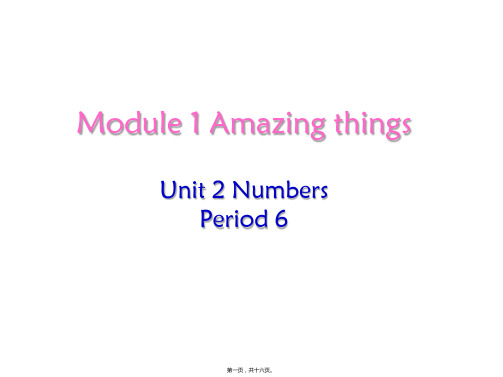
Project
A In groups, brainstorm some topics about numbers. Use the following spidergram to help you.
第十三页,共十六页。
C In groups, write a short article on your topic. Follow the example.
第十六页,共十六页。
第十四页,共十六页。
Self-assessment
第十五页,共十六页。
Homework
1. 完成More practice板块的练习B。 2. 通过书籍、网络等渠道查询相关信息,完成Project
中自己负责的部分。 3. 以班级为单位完成一本完整的关于数字的“迷你百
科全书”。 4. 选择性完成《练习册》第29至32页Integration的练习。
a
Байду номын сангаас
c
b d
第四页,共十六页。
Look and match
developed into
abacus
第五页,共十六页。
More practice
Read the article and plete the table.
第六页,共十六页。
Things people used What to count
第三页,共十六页。
Read, match and rearrange
Read the first sentences in paragraphs 2-5 and then match the pictures below with the words in the box. Then put the pictures in the correct order.
英语(沪教牛津版)教材解读 八年级上册

教材培训手册初中英语(沪教牛津版)上海教育出版社有限公司牛津大学出版社(中国)有限公司目录一、八年级上册教材解读 (2)二、教材配套资源 (27)英语(沪教版)教材解读 八年级上册上海教育出版社1一、八年级上册教材解读(一)教材纵览英语(沪教版)教材解读 八年级上册 上海教育出版社2(二)单元解析单元解析编写的目的是为了帮助教师了解板块关联,从而进行有效的教学设计。
建议教师在备课之前扫读单元思维导图,了解板块关联以及参考案例的教学处理方式,从而提高教学效率。
教师可在此基础上根据自己的教学需要进一步解读教材,并做出符合自己教学需要的教英语(沪教版)教材解读 八年级上册上海教育出版社3英语(沪教版)教材解读 八年级上册 上海教育出版社4英语(沪教版)教材解读 八年级上册 上海教育出版社5Unit 4英语(沪教版)教材解读 八年级上册 上海教育出版社6英语(沪教版)教材解读 八年级上册 上海教育出版社7英语(沪教版)教材解读 八年级上册 上海教育出版社8英语(沪教版)教材解读 八年级上册 上海教育出版社9Unit 8英语(沪教版)教材解读 八年级上册 上海教育出版社10(三)教学建议在七年级英语学习的基础上,学生具备了一定的语言学习基础和能力。
因此,在八年级的教学中应当凸显―听‖―说‖―读‖―写‖各项微技能的教学,以帮助学生在后续的学习中进一步提升自己的学习能力,并运用所学的微技能发现问题、解决问题,从而具备自主英语学习的能力。
1、阅读教学建议(1)运用―略读与找读(skimming and scanning)‖开展阅读教学活动略读是指快读阅读文章以了解其内容大意的预读方法。
略读是有选择性地进行阅读,可以跳过某些细节,要求抓住文章的大概,从而加快阅读速度。
在略读时,往往通过浏览文章的引言、标题、小标题、每段的首末句及插图来迅速了解文章的内容。
找读是一种从大量的资料中迅速查找某一项具体事实或某一向特定信息,如人物、事件、时间、地点、数字等,对其他无关部分则略去不读的快速阅读方法。
沪教牛津版八年级上册 Ancient stories Listening课件

3. How could the soldiers steal the gold in Sparta? Because the King of Sparta was not in the city.
4. Where are Paris and Helen? They are in Troy.
5. Whose ships are these?
8. My grandfather fought in two _w_a_r_s_ (war) when he was young.
9. Anna _h_a_s_s_t_u_d_ie_d_ (study) in the middle school for two years.
10. The man had a serious disease last year. After that, he gave up _s_m_o_k__in_g_ (smoke).
6. As soon as I __e_n_t_e_re_d___ (enter), they stopped the conversation and walked away.
7. Millie succeeded in w__o_r_k_in_g_ (work) out the Maths problem by herself.
— I see. 3. A thief _s_to_l_e_ (steal) a lot of money from the bank last
night. 4. There is a _d_if_f_e_re_n_c_e_ (different) in Sara. She has
changed her hairstyle. 5. Our family _h_a_v_e_l_iv_e_d_ (live) in Shenzhen since 2004.
沪教牛津版八年级上册 Computers Reading 课件

D2
Read the article again and below in complete sentences.
answer
the
questions P37
1. What were the first computers like? _T_h_e_y__w_e_r_e_b_i_g_g_e_r_t_h_a_n_c_a_r_s_.___________________
A sub-heading usually tells us the topic of the paragraph(s) below it.
P34
1. Computers are getting smaller and better. √ 2. Computers can do important jobs like √
Is a computer cleverer than me?
Answer No.
Reason
Human brains can produce new ideas but computers cannot.
The future of They may be able to do a better job computers than human beings.
Smaller and better
bigger than cars
smaller and better
There is probably a tiny computer inside your TV or washing machine. You depend on computers more than you realize.
沪教牛津版八年级上册 English Week Grammar课件

4. Above all, you should enjoy English.
A Modal verb: should
We can use should to say what is best or right to do.
3. — May/Can I use your mobile phone? — Yes, you may/can.
你还知道 哪些情态
动词?
— No, you may not/can't.
4. You must not/mustn't do that, Benny.
5. We must always be careful with electricity.
1. Vicky does not feel well. She has got a cold. You say to her, “_Y_o_u__'d__b_e_tt_e_r_g_o__a_n_d__se_e__a_d_o_c_t_o_r.”
2. Mandy and Jason are going to have a picnic with Judy. Mandy and Jason have arrived but Judy is late again. Mandy says to Jason, “__Y_o_u_'_d_b_e_t_t_er__n_o_t_a_s_k_h__er__to___ _c_o_m_e__a_lo_n__g_n_e_x_t_t_im__e_.”
4. — You'd better ______ on the phone when you cross the road. It's dangerous.
新沪教牛津版八年级上册英语 Unit 2 Period 4 教学课件

______ equals/is ______. (
)
第十三页,共十四页。
Homework
1. 模仿录音的语音、语调,与同学操练对话。
2. 完成《练习册》第19至21页Grammar。
第十四页,共十四页。
)
3 S1: M________ 7 ______ 8.
S2: ____ m________ by ______ equals/is ______. (
)
4 S1: D________ 16 ______ 4.
S2: ______ d________ by ______ equals/is ______. (
first 2
third fourth twelfth 19 twenty-third twenty-eighth
第八页,共十四页。
Instructions about numbers
add … and … subtract … from … multiply … by… divide … by …
第五页,共十四页。
Read the following numbers.
2,534 25,342 253,423
2,534,233
25,342,330
two thousand five hundred and thirty-four
twenty-five thousand three hundred and forty-two
Module 1 Amazing things
Unit 2 Numbers
Period 4
第一页,共十四页。
Period 4
第二页,共十四页。
Cardinal numbers
沪教牛津版八年级上册 Educational exchanges Speaking课件
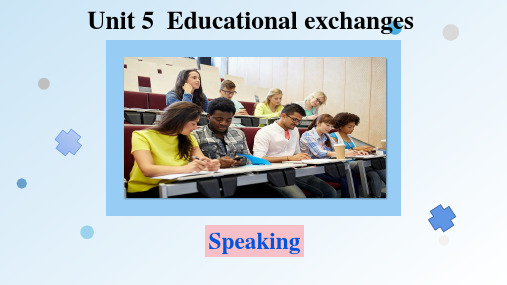
finished drawing a picture. I haven't gone swimming. I
haven't watched TV. I haven't talked with my parents
about my studies …
降调可以表明所说内容是确切的、完整的。声音 通常落到句末几个单词的最后一个重读音节上。 降调主要用于陈述句、特殊疑问句和祈使句。 注意:如果陈述句用升调,则表示疑问。
S2: You should be polite and respect local culture.
Arrive at the airport on time, please.
Please bring a camera with you.
A Talk time Intonation (2): Falling intonation
Possible answers.
S1: What have you done since last week? S2: I've had lessons.
I've finished all my homework … S1: What haven't you done since last week? S2: I haven't played computer games.
P74
B Speak up
P75
B1 Alice has been in London for a week. She has written down some things that she has done and some that she has not done. Look at the lists below and talk about her experiences in pairs.
- 1、下载文档前请自行甄别文档内容的完整性,平台不提供额外的编辑、内容补充、找答案等附加服务。
- 2、"仅部分预览"的文档,不可在线预览部分如存在完整性等问题,可反馈申请退款(可完整预览的文档不适用该条件!)。
- 3、如文档侵犯您的权益,请联系客服反馈,我们会尽快为您处理(人工客服工作时间:9:00-18:30)。
沪教牛津版八年级上册英语知识点总结全册(广州地区)Unit 1 Encyclopedias (4)✧单词 (4)✧短语 (5)✧重点句型 (5)✧课文翻译 (6)✧知识点解析 (7)✧习题 (13)Unit 2 Numbers (16)✧单词 (16)✧短语 (17)✧重点句型 (18)✧课文翻译 (18)✧知识点解析 (19)✧习题 (36)Unit 3 Computers (38)✧单词 (38)✧短语 (39)✧重点句型 (39)✧课文翻译 (40)✧知识点解析 (41)✧习题 (58)Unit4 Inventions (61)✧单词 (61)✧短语 (62)✧重点句型 (63)✧课文翻译 (63)✧知识点解析 (65)✧习题 (68)Unit5 Educational exchange (71)✧单词 (71)✧短语 (72)✧重点句型 (72)✧课文翻译 (73)✧知识点解析 (74)✧习题 (83)Unit 6 Ancient stories (85)✧单词 (85)✧短语 (87)✧重点句型 (87)✧课文翻译 (88)✧知识点解析 (89)✧习题 (95)Unit 7 Memory (100)✧单词 (100)✧短语 (101)✧重点句型 (101)✧课文翻译 (102)✧知识点解析 (103)✧习题 (109)Unit 8 English Week (114)✧单词 (114)✧短语 (115)✧重点句型 (115)✧课文翻译 (116)✧知识点解析 (117)✧习题 (122)每单元必考语法点预览Unit 1 some与any的用法& 复合不定代词somebody, anybody, nobody等的用法Unit 2基数词及数字的表达& 序数词Unit 3形容词的比较级与最高级Unit 4 good, bad, far & (not) as…as…Unit 5现在完成时& already, yet, ever, neverUnit 6 现在完成时中since, for & 现在完成时与一般过去时的区别Unit 7(真实性)条件状语从句& if…not 与unlessUnit 8情态动词should, had betterUnit 1 Encyclopedias 单词suddenly adv. [ˈsʌdn:lɪ] 意外地,忽然地nobody pron. [ˈnoˌ bədi] 没有人,无人fossil n. [ˈfɑsəl] 化石win v [wɪn] 获胜,赢dollar n [ˈdɑlɚ] 美元✧短语1.in the countryside 在乡村,在农村11.for example 例如2.human being 人12.next to 紧挨着3.die out 灭绝,消失13.look up 查阅4.find out 了解,弄清14.live on Earth 生活在地球上5.go for a walk 去散步15.an Italian painter 一位意大利画家6.be born 出生ed to do sth 过去常常做某事7.more than 多于,超过17.at the end of 在…末尾8.just like 正如,正像18.in the centre 在中心9.how long 多久e out of…从…出来10.would like 想要20.be famous for 以…而闻名✧重点句型1.Some dinosaurs were as small as chickens. 有的恐龙和鸡一样小。
2.Dinosaurs lived on Earth more than 60 million years before human beings.恐龙早于人类生活在地球上六千多万年。
3.Suddenly dinosaurs all died out. 突然恐龙都灭绝了。
4.However, we can learn about dinosaurs from their fossils.然而,我们可以从恐龙的化石了解它们。
5.Nobody knows why. 没有人知道其中的原因。
6.Would you like some tea? 你想要一些茶吗?课文翻译Look it up! 查一查Here are two articles from an encyclopedia. 这是一本百科全书中的两篇文章。
Da Vinci, Leonardo达芬奇,列奥纳多Leonardo da Vinci(1452-1519) was an Italian painter, inventor, musician, engineer and scientist. Da Vinci was born in the countryside. From an early age, he showed great intelligence and artistic ability. As he grew older, he learnt to do many different things. His paintings are very famous, and one, the Mona Lisa, is perhaps the most famous painting in the world. He also had many inventions. For example, his note books include some interesting drawings of flying machines. (SeeArt) 达芬奇(1452-1519)是意大利画家、发明家、音乐家、工程师和科学家。
达芬奇出生在农村。
从很小的时候起,他就表现出了极大的智慧和艺术能力。
随着年龄的增长,他学会了做很多不同的事情。
他的画非常有名,其中之一,蒙娜丽莎,也许是世界上最著名的画。
他也有很多发明。
例如,他的笔记本包括一些有趣的飞行机器图纸。
(见艺术)Dinosaurs恐龙Dinosaurs lived on Earth more than 60 million years before human beings. They lived everywhere on Earth. Some dinosaurs were as small as chickens. Others were as big as ten elephants. Some could even fly. Many dinosaurs ate plants. However, some dinosaurs liked to eat meat. Dinosaurs lived on Earth for more than 150 million years. Then, suddenly, they all died out. Nobody knows why. However, wecan learn about them from their fossils. (See Earth history)恐龙在人类之前生活在地球上超过6000万年。
他们住在地球上的任何地方。
有些恐龙和鸡一样小。
其他和十头大象一样大。
有些甚至可以飞。
许多恐龙吃植物。
然而,一些恐龙喜欢吃肉。
恐龙在地球上生活了1亿5000万多年。
突然,他们都死了。
没有人知道原因。
然而,我们可以从它们的化石中了解它们。
(参见地球历史)More practiceAustralia's big attractions澳大利亚的大景点Australia is a very big country. It also has many big attractions.澳大利亚是一个很大的国家。
它也有很多吸引人的地方。
The Big Banana大香蕉The Big Banana is in Coffs Harbour. It was made in 1964 by John Landy. Landy wanted something to make people come to his fruit shop, so he built the Big Banana.The idea worked. Many people visited his fruit shop and took pictures of the Big Banana. Soon people all over Australia began making big things.大香蕉在科夫斯港。
它是由John Landy在1964建立的。
兰迪想让人们到他的水果店去,所以他做了一个大香蕉。
这个主意奏效了。
许多人参观他的水果店,拍了一张大香蕉的照片。
很快,澳大利亚各地的人们开始制造大的东西。
The Big Merino大美利奴羊The Big Merino is in the city of Goulburn. Merinos are a type of sheep. They can live in dry weather. Some places in Australia are very dry, so these sheep are very important to the farmers there. Inside the Big Merino, there is a small museum about the history of wool in Australia. Visitors can also climb up to the Big Merino's head and look at the view through its eyes.大美利奴人在Goulburn市。
美利奴羊是一种绵羊。
他们可以在干燥的天气里生活。
澳大利亚有些地方很干燥,所以这些羊对那里的农民很重要。
在大美利奴的内部,有一个关于澳大利亚羊毛历史的小博物馆。
游客也可以爬到大美利奴的头上,透过它的眼睛看风景。
知识点解析1. Is my encyclopedia useful?1) useful:有用的,有益的,有帮助的 a useful book2) use+ful= useful 名词+ful= 形容词3) 以-ful结尾的形容词的反义词多是相应的以-less结尾的形容词。
eg:useful--useless careful--careless helpful--helpless2. Leonardo da Vinci was an Italian painter, inventor, musician, engineer and scientist.动词后加后缀-er/ -or构成一种职业。
